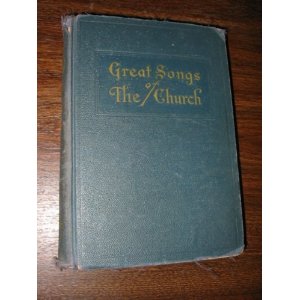The asterisk (*) before a verse marks the stanza that may be omitted, if necessary, without materially affecting the continuity of thought.
-Forward to the 54th edition of Great Songs of the Church
 Each year I pick an old hymnbook off the shelf and sing through the songs (not all at once, mind you, but over the course of the year). This year I pulled down an old, 1974 edition of Great Songs of the Church. I like to remember the old songs, and they will only be remembered if sung. Hymn #4 in this hymnbook is “Alas and Did My Savior Bleed,” and as I was singing this hymn I noticed an asterisk by verse 2. At the bottom of the page there was an asterisk attached to the words “See Note in Foreword,” so I did. The note from the foreword is the one mentioned above. This is a six verse hymn in the 54th Great Songs hymnbook, which some song-leaders might think too long. And so instead of just leading verses 1, 2, and 5 the editors have chosen which verse may be deleted without “materially” interrupting the continuity of thought. That word “materially” sounds lawyerly and makes me immediately suspicious.
Each year I pick an old hymnbook off the shelf and sing through the songs (not all at once, mind you, but over the course of the year). This year I pulled down an old, 1974 edition of Great Songs of the Church. I like to remember the old songs, and they will only be remembered if sung. Hymn #4 in this hymnbook is “Alas and Did My Savior Bleed,” and as I was singing this hymn I noticed an asterisk by verse 2. At the bottom of the page there was an asterisk attached to the words “See Note in Foreword,” so I did. The note from the foreword is the one mentioned above. This is a six verse hymn in the 54th Great Songs hymnbook, which some song-leaders might think too long. And so instead of just leading verses 1, 2, and 5 the editors have chosen which verse may be deleted without “materially” interrupting the continuity of thought. That word “materially” sounds lawyerly and makes me immediately suspicious.
The verse chosen for omission is the line: Was it for crimes that I have done he groaned upon the tree? Amazing pity, grace unknown, and love beyond degree.
I happen to like this verse because the phrase “groaned upon a tree” is so evocative. The editors of Sacred Selections, and Christian Hymns must have agreed because they include verse 2. In these once ubiquitous hymnbooks the song only has four verses, and both omit the same verse, verse 4: Thus might I hide my blushing face while his dear cross appears; Dissolve my heart in thankfulness, and melt mine eyes to tears. I guess if you’re going to cut a verse this would be the one. As a guy, I think it’s a little weird to sing about “my blushing face.” Also, I get a little squeamish thinking about eyes melting into anything – ouch.
And yet, the last verse begins with the phrase But drops of grief can ne’er repay the debt of love I owe….. and without verse 4 you don’t know what “drops of grief” we’re singing about.
My point is this: All the verses have to be there. We may not use them all, all of the time, but we need to know them all – and I am not talking primarily about hymnbooks – I’m talking about the Bible.
I play favorites with verses. There are some I continually return to, and some others I rarely mention when I preach. I always (always) mention John 3.5 when delivering the invitation. I like this verse because it comes from the mouth of Jesus. But Galatians 3.27, Acts 2.38, I Peter 3.20 and several other verses would serve as well or better depending on the situation. I also find I return for personal study to the passages I like. Any of the Gospels, I John, Ecclesiastes, Ruth, the Psalms – these I read over and over again. I hate to admit that I really have only a cursory knowledge of Jeremiah, Ezekiel, and Hebrews (although Mickey’s Sunday morning class is helping immensely). I would like to say, in the words of James, “My brethren, these things ought not to be this way,” (3.10).
At the beginning of a new year, as we plan out our Bible study, let us all remember that any omission “materially” affects the continuity of thought, and that ALL scripture is inspired by God, and thoroughly prepares us for every good work (II Timothy 3.16-17). Let us be committed to listen to the whole counsel of God – not just the verses we like.

